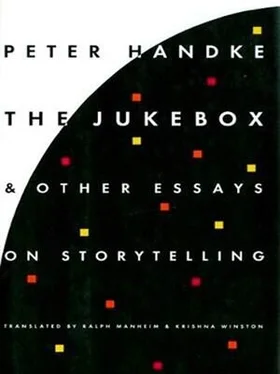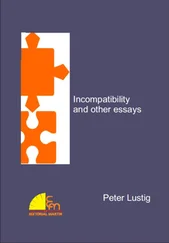You make it sound as though your successful day were child’s play.
No answer.
By then it was noon. The night’s hoarfrost had thawed even in the shaded corners of the garden, and as the bowed, stiff blades of grass straightened up, a soft breeze blew through them. A stillness arose, became a picture when he walked in the sunlight on the untraveled noonday road, with those pairs of varicolored butterflies which, emerging unexpectedly out of the void, seemed to be moving backward and came so close to the wayfarer that he seemed to feel in his outer ears the vibration of their wings, which instantly communicated itself to his steps. For the first time he heard, in the interior of the almost uninhabited house, the midday bells of the village church mingling with those of the next village (which, as usual in this part of the country, began without transition or interval, on the other side of the street) ring out with a palpable message: a call in all directions to all isolated beings. The city of Paris lay deep at the bottom of a bowl, surrounded by stony desert mountains, and in the soundless dusk the fervid calls of the muezzins poured down upon it from every peak and slope round about. Involuntarily he looked up from the line he was reading and went out with the cat, crossing the garden in a long, curving diagonal; it passed through his mind how long ago another cat had announced the onset of rain by galloping to shelter under the overhanging roof the moment the first drop from the distant horizon fell on its fur. He looked around, noted, as he had done for weeks, how the garden’s last fruit, one enormous pear, still hung on the otherwise empty tree, and hefted it for a moment in the hollow of his hand, while across the street, in the neighboring village, a black-haired Chinese girl carrying a varicolored back satchel kept stroking a blue-eyed Alaskan dog through the fence (though he could not hear it, the dog’s whimpering was all the more prolonged in his imagination), and a little farther on, in the gap between the houses at the distant junction of two streets, the sun’s reflection on a passing train lit up the grass of the embankment for a moment, the length as it were of a word, a monosyllable, during which he glimpsed an empty seat in one compartment, slashed with a knife and mended with fairytale care, cross-stitch after cross-stitch in the stiff plastic fabric, and he felt himself gripped by the faraway hand that was pulling the thread tight. Thus his forehead grazed his dead; he watched them just as they watched him, he who was doing nothing but sitting there, sympathetically, not at all as in their lifetime. What more was there to do, to discover, to recognize, to discover in a day? Behold: no king of eternity, no king of life (and if so only a “secret” one) — No, here stands the king of the day! The only odd part of it was that at this point a trifle sufficed to topple him from his imperious throne. At the sight of the passerby who came sauntering out of the side street, with his coat over his arm, stopped, patted his pockets, and quickly turned back, my sympathy turned to desperation. Stop! But once in ecstasy I could no longer find the way back into myself: There, the blackbird’s yellow bill. And, at the end of the avenue, the brownish edge of the one mallow still in bloom. And that leaf — tugging at an invisible thread as it falls, and apparently rising back into the sun — it looks like a bright-colored kite. And the horizon, black with a swarm of monumental, meaningless words! Stop! Leave me in peace! (To him ecstasy meant panic.) But enough! Stop! — No more reading, gazing, being-in-the-picture, no more day — this couldn’t go on. What now? And unexpectedly, after the procession of leaping forms and ecstatic colors, long before nightfall, death barred the passage through this day. At one stroke, its sting punctured the whole extravaganza. After that, could anything be more crackbrained than the idea of a successful day? Mustn’t his essay on it start all over again, with a radically new attitude, that of gallows humor? Is it impossible to lay down a line for the success of a day, not even a labyrinthine line? But must one not infer that this constant starting the essay from scratch is itself a possibility, the possibility specific to the project? The essay must be. Quite possibly the day (the object named “day”) had now become my mortal enemy, an enemy that cannot be transformed into a helpful living-and-traveling companion, a luminous model, a lasting fragrance, quite possibly the “successful day” project is diabolical, an invention of the devil, the disrupter, a veil dance with nothing behind it, a maddening tongue play, followed directly by a devouring, a road pointer which, if you follow it, closes into a noose; that may be, but I fail to see why, in view of all the failures I have met with in my quest for a successful day, I am still unable to say that the idea of a successful day is a snare and a delusion, and consequently that cannot be the case. I can say, however, that the idea is indeed an idea, for I didn’t think it up or get it from my reading; it came to me in a time of distress, and it came with a power which for me has always carried credibility — the power of the imagination. Imagination is my faith, the idea of a successful day was conceived in its most ardent moment, and after each one of my countless shipwrecks, on the following morning (or afternoon) it lit the way for me anew, just as in Morike’s poem a rose “vorleuchtet” (shone before), and I was able with its help to make a fresh start. The success of the day was something that had to be attempted — even if in the end the fruit turned out to be hollow or dry: thus this vain labor of love was superfluous at least for the foreseeable future, and then the road would be open for something different. And another dependable insight was that a “nothing” day (a day marked not even by changing lights, a day without wind or weather) gave promise of the utmost richness. Nothing was, and again there was nothing, and again there was nothing. And what did this nothing and again nothing do? It signified. More was possible with nothing but the day, far far more both for you and for me. And that was the crux: the main thing was to let the nothing fructify from morning to night (or even midnight). And I repeat: the day was light. The day is light.
The blackness of the nameless pond in the woods. Snow clouds above the Île de France horizon. The smell of pencils. The ginkgo leaf on the boulder in the garden of La Pagode cinema. The carpet in the topmost window of the Velizy railroad station. A school, a pair of children’s glasses, a book, a hand. The whirring in my temples. For the first time this winter, the powerful cracking of the ice under the soles of my shoes. In the railroad underpass, he acquired eyes for the substance of light. Reading in a crouch, close to the grass. While I was breaking off leaves, suddenly a whiff in my nostrils resembling the essence of the declining year. The word for the sound of the train pulling into the station had to be “thumping,” not “clanking.” And the last leaf falling from the tree didn’t “crackle,” it “clicked.” And a stranger involuntarily exchanged greetings with him. And again the old woman hauled her pushcart to the weekly village market. And the usual disorientation of a foreign car driver in this out-of-the-way place. And then in the forest, the greening of the path where he used to take a walk with his father whenever there was something to talk over, a path that even had a name in his language, zelena pot, “the green path.” And then in the bar near the church of the next village, the pensioner, whose grandfather’s watch chain extended in a curved line from his belly to his trouser pocket. And for once he overlooked the evil eye cast by one of the old inhabitants. And the proverbial “Thanks [instead of disgruntlement] for your trouble”; for once the transformation was successful. But why then in the middle of the enjoyable afternoon, fear of the rest of the day, of nothing but the day? As though there were no getting through the coming hours (“This day will be the end of me”) — no way out. The ladder leaning against the early-winter tree. So what? The blue of the flowers deep in the grass of the railroad embankment — so what? Paralysis, consternation, a kind of horror, and the serene silence shattered by more and more speechlessness. Eden is burning. And, on the other hand, it becomes evident that there is no formula for the success of a day. “0 morning!” The exclamation doesn’t work. No more reading, no more day? No more possession of words? No more day? And such muteness excludes prayer, all but such impossible prayers as “Morning me,” “Early me,” “Begin me again.” Who knows whether certain mysterious suicides were the secret consequences of such a quest for the successful day, begun energetically on the so-called ideal line. But, on the other hand, doesn’t my failure to stand up to the day tell me something? That my internal order is wrong? That I’m not made for a whole day? That I shouldn’t look for morning at nightfall? Or perhaps I should?
Читать дальше












